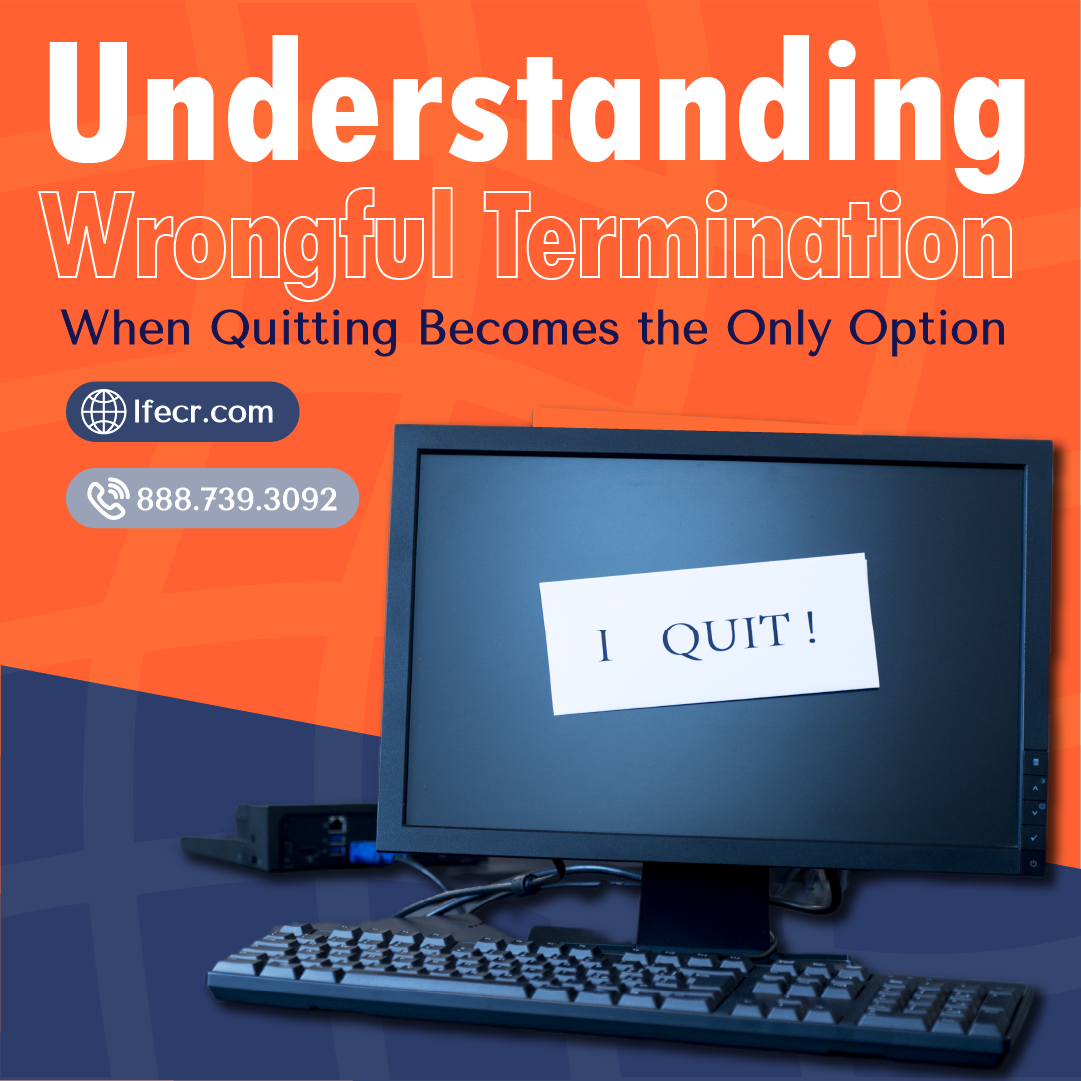Wrongful termination occurs when an employee is dismissed in violation of state or federal laws. It can take various forms, such as when an employee is fired for discriminatory reasons, in retaliation for exercising legal rights (such as whistleblowing), as a result of harassment or a hostile work environment, or in breach of the terms and conditions outlined in an employment contract. Wrongful termination may result in legal consequences for the employer, including potential legal claims and compensation owed to the terminated employee.
When Are You Forced to Quit Your Job?
Sadly, there are instances where the work environment becomes so intolerable that employees feel they have no choice but are forced to quit their job. In such cases, you may find yourself "constructively discharged," meaning your resignation was essentially forced by your employer's actions. It's crucial to document these instances, as evidence is vital in proving a constructive discharge claim.
Being forced to quit a job is a difficult situation that can arise due to various factors. Here are some examples of situations where employees might feel compelled to resign from their jobs:
- Harassment and Discrimination: Persistent harassment, bullying, or discrimination based on factors such as race, gender, religion, sexual orientation, or disability can create an untenable work environment. If an employer fails to address these issues despite complaints, an employee may feel they have no choice but to resign.
- Hostile Work Environment: A work environment that is consistently hostile, toxic, or psychologically damaging due to factors like a high level of conflict, unethical practices, or unreasonable demands can lead employees to quit to protect their mental and emotional well-being.
- Retaliation: When an employee faces adverse actions, such as demotion or reduced responsibilities, as a result of whistleblowing, reporting illegal activities within the organization, or exercising their legal rights (e.g., requesting reasonable accommodations for a disability), they may feel
forced to quit job
due to the retaliatory atmosphere.
- Unlawful Practices: Discovering that the employer is engaging in illegal activities or asking employees to participate in illegal practices can put employees in a morally compromising situation. If the employer does not rectify the situation, employees might resign to avoid legal consequences or ethical dilemmas.
- Safety Concerns: In situations where an employer consistently fails to provide a safe and healthy work environment, employees may feel their physical safety is at risk, leading them to resign out of concern for their well-being.
- Breach of Contract: When an employer violates the terms of an employment contract, such as failing to provide promised benefits or compensation, employees may resign due to the employer's failure to uphold their end of the agreement.
- Unreasonable Demands: Excessive and unreasonable work demands, such as an unmanageable workload, unrealistic deadlines, or an expectation to work excessive overtime without compensation, can lead to burnout and employees feeling compelled to resign.
- Constructive Discharge: Constructive discharge occurs when an employer makes working conditions so intolerable that an employee has no other option but to resign. This may include situations where an employer consistently humiliates an employee, denies them essential resources, or isolates them from colleagues.
- Health Reasons: If an employee's physical or mental health deteriorates as a direct result of their job, and the employer does not make reasonable accommodations or address these concerns, the employee may resign to prioritize their health.
These examples illustrate the various circumstances in which an employee may feel forced to quit their job, often due to challenging workplace conditions or violations of their rights. It's important for employees facing such situations to seek legal advice and explore their rights and options before making the decision to resign.
The Role of a Wrongful Termination Lawyer
If you've been forced to quit your job due to intolerable conditions, consulting with a
wrongful termination lawyer is a wise course of action. An experienced attorney can help you evaluate the strength of your case, guide you through the legal process, and determine the best course of action. They can also help you gather evidence to support your claim, negotiate with your former employer, and if necessary, file a lawsuit to seek justice. In some cases, you may be entitled to reinstatement, back pay, or compensation for emotional distress.
Know Your Rights
Understanding wrongful termination is vital for protecting your rights as an employee. No one should have to endure an unbearable work environment or be forced to quit their job unlawfully. If you find yourself in such a situation, remember that you have recourse. Consult with, LFECR, an experienced wrongful termination law firm who can provide guidance, support, and legal representation to help you pursue justice and hold your former employer accountable for their actions. Wrongful termination cases can be complex, but with the right legal counsel, you can navigate the legal process and work towards a fair resolution.
If you or someone you know is seeking support, our experienced labor rights lawyers at Lawyers for Employee and Consumer Rights are here to guide you towards a resolution that upholds your rights and dignity.
Call
844-619-7541 today for a free and confidential consultation to get the help you need and deserve.
Frequently Asked Questions
1. If I quit my job, can it still count as wrongful termination in California?
Yes. In California, quitting does not automatically disqualify you from a wrongful termination claim. If your employer made working conditions so intolerable that a reasonable person would feel forced to resign, the law may treat your resignation as a
constructive discharge, which can be legally equivalent to being fired.
2. What makes a workplace “intolerable” under California law?
Intolerable conditions typically go beyond ordinary job stress or personality conflicts. Examples include ongoing harassment or discrimination, retaliation for reporting misconduct, unsafe working conditions, unlawful pay practices, or repeated employer actions that undermine your ability to do your job. Courts look at whether a reasonable employee would feel they had no realistic option but to quit.
3. Do I need proof if I claim I was forced to quit?
Yes. Documentation is critical in constructive discharge cases. Emails, text messages, performance reviews, witness statements, HR complaints, medical records, and notes detailing incidents can all help establish that the working conditions were unlawful and persistent, not isolated or just minor issues.
4. Should I report the problem to HR before quitting?
In many cases, yes. Reporting issues internally can strengthen your claim by showing that your employer was aware of the problem and failed to correct it. However, there are situations, such as severe harassment or immediate safety risks, where quitting without prior reporting may still be legally justified. An employment attorney can help assess your specific situation.
5. How is constructive discharge different from a hostile work environment under California law?
A hostile work environment refers to unlawful workplace conduct, such as harassment or discrimination. Constructive discharge occurs when that hostile environment becomes so severe or pervasive that it effectively forces you to resign. Not every hostile workplace leads to constructive discharge, but many constructive discharge claims begin with a hostile work environment.
6. What compensation might be available if I prove wrongful termination?
Depending on the circumstances, you may be entitled to back pay, lost benefits, emotional distress damages, reinstatement, or punitive damages. In some cases, your employer may also be required to pay attorney’s fees and costs. The available remedies depend on the specific laws violated and the strength of the evidence.
7. When should I contact a California wrongful termination lawyer?
If you are considering quitting due to unlawful treatment, or have already resigned, it’s wise to speak with an employment attorney as soon as possible. Timing matters, and an attorney can help you preserve evidence, meet legal deadlines, and determine whether your situation qualifies as wrongful termination under California law.






